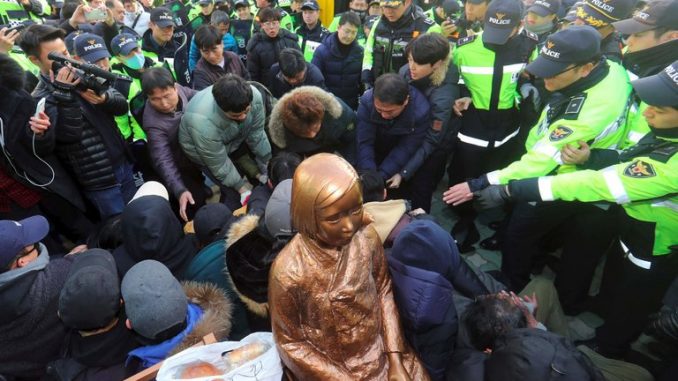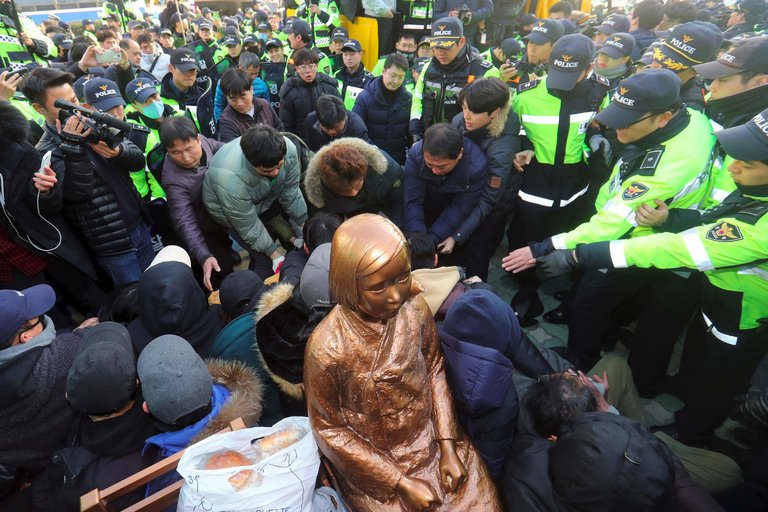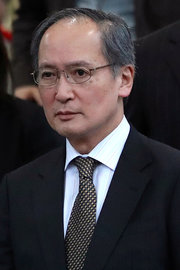
The two key US allies have long battled over legacy of Japan’s brutal colonial rule of Korea and its wartime institution of “comfort women,” a euphemism both countries have used to describe Korean women forced into sexual servitude for Japanese soldiers during World War II. “North Korea has just hijacked all the issues. There was no choice for Tokyo and Seoul but to collaborate with each other.” Here, South Korean activists staging a December protest outside the Japanese Consulate in Busan, SK’s second largest city, supporting a statue memorializing Korean women forced into sexual slavery during the war.
Japan announced in early April that its envoy to South Korea would return to Seoul,
three months after he was recalled in a dispute arising from the sensitive issue of Korean women forced into sexual servitude for Japanese soldiers during World War II.
Foreign Minister Fumio Kishida said Ambassador Yasumasa Nagamine would return to his post,
as would Yasuhiro Morimoto, the consul general in Busan, South Korea’s second-largest city.
Both were recalled in January to protest a statue commemorating the so-called comfort women, which Korean activists had erected outside the Busan consulate.
The statue — a life-size, bronze figure of a barefoot girl wearing traditional Korean dress — remains in place,
and the countries have reached no agreement about it.
But Kishida said the diplomats would return nevertheless,
citing a pressing need “for close communication with the South Korean government”
to help deal with North Korea’s advancing nuclear and missile development.
Kishida said Japan also needed to prepare for the election of a new South Korean president in May to replace Park Geun-hye,
who was removed from office last month and jailed in early April on corruption charges.
There was no immediate official response from South Korea to Japan’s announcement.
The two key US allies have long battled over the legacy of Japan’s brutal colonial rule of Korea and its wartime history,
particularly in relation to the comfort women, a euphemism that both countries have used.
Japan’s ambassador to South Korea, Yasumasa Nagamine.
Japan withdrew its diplomats in January to protest what it saw as a violation of a December 2015 agreement between the two countries, meant to resolve the longstanding dispute.
Many South Koreans had accused Japan of failing to fully accept responsibility for what happened to the women and demanded that Tokyo compensate survivors.
In the 2015 deal, Japan apologized and promised to pay $8.3 million into a fund for surviving comfort women in South Korea.
In return, South Korea promised not to press any future claims
and agreed to discuss Japan’s protests with activists
who had erected a statue of a comfort woman near the Japanese Embassy in Seoul — which is still there.
When activists put up the Busan statue in December, the police removed it — but it was quickly reinstated after public pressure.
Japan said in January that its recall of the diplomats was temporary.
But as their absence went on longer than many analysts had expected, the recall started to look like a standoff.
In the end, more pressing geopolitical concerns trumped the quarrel.
“North Korea has just hijacked all the issues,” said Ken Jimbo, an associate professor of policy management at Keio University in Tokyo.
He said there was “no choice for Tokyo and Seoul but to collaborate with each other.”
Other analysts said Japan had made a tactical error in recalling the ambassador in the first place.
Yoshiki Mine, a former official with the Foreign Ministry in Japan, said the dispute over the statues was an isolated issue
that should not define all relations between Japan and South Korea.
“The relationship between the two countries is very complicated and wide ranging,”
said Mine, now head of the Institute for Peaceful Diplomacy, a research organization.
“Therefore we should not make one issue a hostage item.”
Source: Japan Envoy, Recalled Over ‘Comfort Woman’ Statue, Is Returning to Seoul – The New York Times

